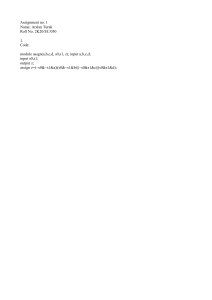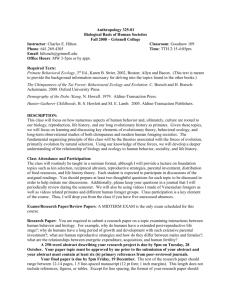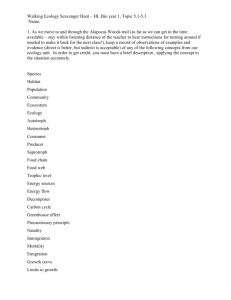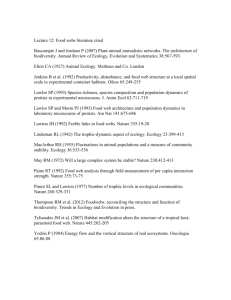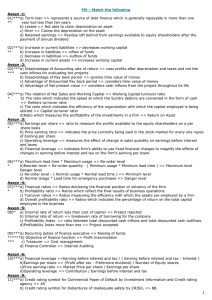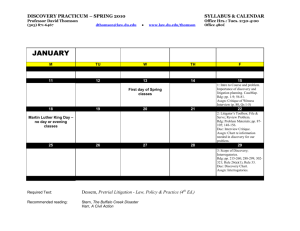ESCI 325: Fundamentals of Ecology
advertisement
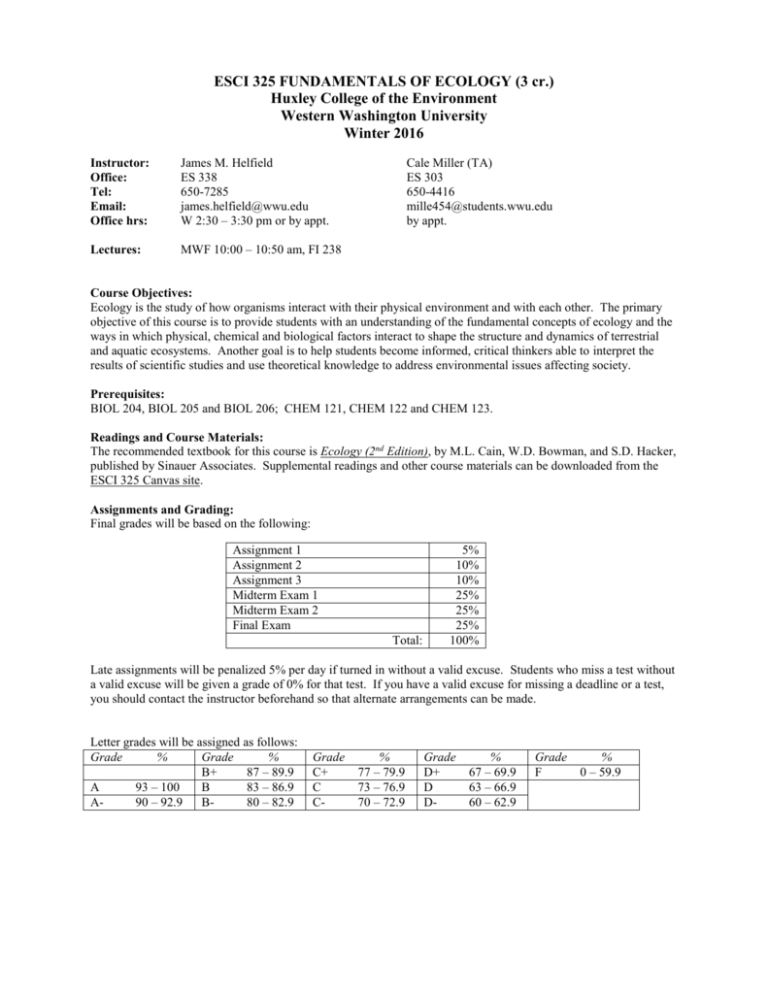
ESCI 325 FUNDAMENTALS OF ECOLOGY (3 cr.) Huxley College of the Environment Western Washington University Winter 2016 Instructor: Office: Tel: Email: Office hrs: James M. Helfield ES 338 650-7285 james.helfield@wwu.edu W 2:30 – 3:30 pm or by appt. Lectures: MWF 10:00 – 10:50 am, FI 238 Cale Miller (TA) ES 303 650-4416 mille454@students.wwu.edu by appt. Course Objectives: Ecology is the study of how organisms interact with their physical environment and with each other. The primary objective of this course is to provide students with an understanding of the fundamental concepts of ecology and the ways in which physical, chemical and biological factors interact to shape the structure and dynamics of terrestrial and aquatic ecosystems. Another goal is to help students become informed, critical thinkers able to interpret the results of scientific studies and use theoretical knowledge to address environmental issues affecting society. Prerequisites: BIOL 204, BIOL 205 and BIOL 206; CHEM 121, CHEM 122 and CHEM 123. Readings and Course Materials: The recommended textbook for this course is Ecology (2nd Edition), by M.L. Cain, W.D. Bowman, and S.D. Hacker, published by Sinauer Associates. Supplemental readings and other course materials can be downloaded from the ESCI 325 Canvas site. Assignments and Grading: Final grades will be based on the following: Assignment 1 Assignment 2 Assignment 3 Midterm Exam 1 Midterm Exam 2 Final Exam Total: 5% 10% 10% 25% 25% 25% 100% Late assignments will be penalized 5% per day if turned in without a valid excuse. Students who miss a test without a valid excuse will be given a grade of 0% for that test. If you have a valid excuse for missing a deadline or a test, you should contact the instructor beforehand so that alternate arrangements can be made. Letter grades will be assigned as follows: Grade % Grade % B+ 87 – 89.9 A 93 – 100 B 83 – 86.9 A90 – 92.9 B80 – 82.9 Grade C+ C C- % 77 – 79.9 73 – 76.9 70 – 72.9 Grade D+ D D- % 67 – 69.9 63 – 66.9 60 – 62.9 Grade F % 0 – 59.9 Schedule: Week Date 1 2 3 4 5 8 9 Dead Readings* F 1/8 SECTION I: INTRODUCTION Introduction to the Course: What is Ecology?; Citing peerreviewed sources; Assgn. 1 Climate and Biomes M 1/11 W 1/13 F 1/15 SECTION II: ORGANISMAL ECOLOGY Evolution and Natural Selection Evolution and Natural Selection (cont’d) Temperature Regulation; ASSGN. 1 DUE M 1/18 W 1/20 F 1/22 No class (Martin Luther King, Jr., Day) Water Regulation Energy and Nutrient Resources M 1/25 W 1/27 Energy and Nutrient Resources (cont’d) MIDTERM EXAM 1 F 1/29 SECTION III: POPULATION ECOLOGY Distribution and Abundance Ch. 8 M 2/1 W 2/3 F 2/5 Population Dynamics Population Dynamics (cont’d); Population Growth; Assgn. 2 Life History Strategies Ch. 10 Ch. 9 Ch. 7 M 2/8 W 2/10 F 2/12 SECTION IV: COMMUNITY ECOLOGY Competition and Niches Exploitation: Herbivory, Predation, Parasitism and Disease Exploitation (cont’d); ASSGN. 2 DUE Ch. 11 Chs. 12&13 M 2/15 W 2/17 F 2/19 No class (Presidents Day) Symbiosis MIDTERM EXAM 2 Ch. 14 M 2/22 W 2/24 Biodiversity; Assgn. 3 Food Webs Chs. 15&18 Ch. 20 F 2/26 SECTION V: ECOSYSTEM ECOLOGY Primary Production and Energy Flux Ch. 19 M 2/29 W 3/2 F 3/4 Nutrient Cycling; ASSGN. 3 DUE Salmon, Bear and Riparian Forests: A Keystone Mutualism?; Disturbance and Succession Ch. 21 Helfield and Naiman 2006 Ch. 16 M 3/7 W 3/9 F 3/11 Island Biogeography Climate Change, Humans and Extinction Loose Ends, Summary and Review Ch. 17 Ch. 24 W 1/6 6 7 Topic Finals M 3/14 FINAL EXAM 10:30 am – 12:30 pm *Unless otherwise indicated, assigned chapters are from the Cain et al. textbook. Ch. 1 Chs. 2&3 Ch. 6 Ch. 4 Ch. 4 Ch. 5
